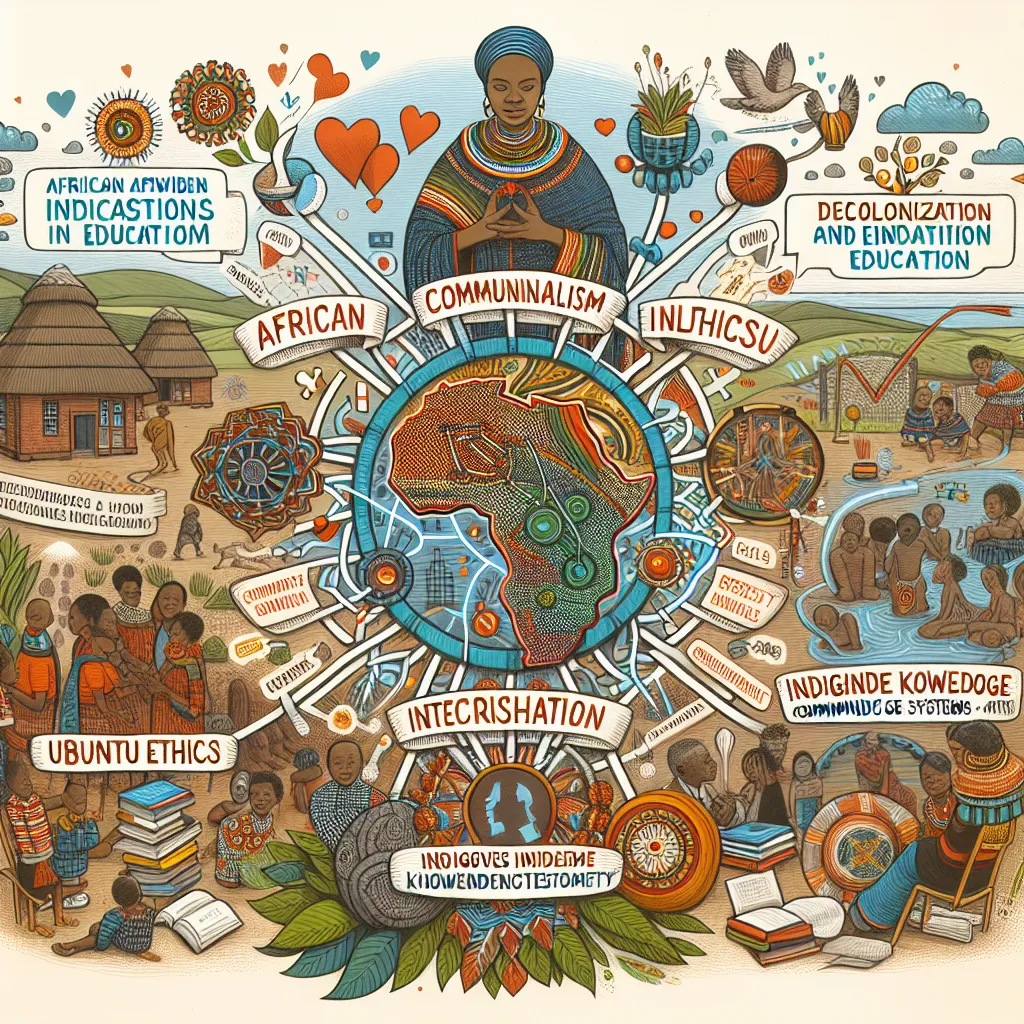Ask AI on The Internet
Question: Read the information in the following table. The concept is explained first and the principles underlying or supporting the concept follow. To ensure that you understand the information, explain it in your own words in one sentence in the space provided. To complete this portfolio, it is important that you understand the concepts described below. General themes or concepts that are important for educators in South Africa. 1. Decolonisation (Education) An active process to change the western-dominated philosophy and approach to education to a balanced approach where indigenous knowledge and pedagogies are acknowledged and genuinely incorporated into the formal educational system. Multiple perspectives are included to make education relevant and practical to address needs and challenges within specific contexts (Owuor:2007). Principles: Mkabela – An African approach to education. Own understanding of concept and examples of implementation and teaching practice. African communalism: Community and belonging to a community are an important aspect of African life. An individual is conceptualised in terms of her/his connectedness in a community (Letseka, 2000). Principles: Individuals are interdependent. Human relationships are important. Content and knowledge must be useful for practice. Own understanding of concept and examples of implementation and teaching practice. Ubuntu (Humanness) A philosophy that promotes the common good of society. It focuses on ethical standards that a person acquires throughout his/her life and, therefore, education plays a very important role in transferring the African philosophy of life. The values of caring, sharing and dignity are important Letseka (2000). Principles: Understanding the uniqueness of all persons. Recognising the humanity of others to affirm your own humanity. The welfare of others is important. Fairness and humanness are crucial to personal well-being. In a fulfilled and flourishing life, people are reasonably well fed, well clothed and housed, in good health, loved, secure, and able to make a conscious effort to treat others with fairness and humanness. Fairness and communality; individuals are interdependent. Human relationships are important. Therefore, respect, interpersonal skills and cooperative skills are important. Own understanding of concept and examples of implementation. What does this mean in your practice as a teacher? Africanisation: Using an African point of departure to change or incorporate the African outlook and character in all aspects of an education grounded in a South African context. Principles: Our schools are situated in the South African context. Principles that guide African ways of thinking, which might be invaluable in making education more accessible to South African learners: Examples: Respect different ways of learning, (Letseka); use different processes and methods of assessment (Beets & Le Grange). Use examples from South Africa and other countries. Own understanding of concept and examples of implementation. What does this mean in your practice as a teacher? Indigenous Knowledge Systems (IKS) A complex set of activities, values, beliefs and practices that evolved over time and that are still actively practiced. IKS is developed and sustained through traditional education. It provides skills, trade, training and socialisation avenues. It is a process of knowledge transmission that occurs within the context of family, community, and cultural age groups. A lifelong learning process involving progression through age groupings, seniority and the wisdom of others. Principles: Knowledge and wisdom advance with the age and life experiences of individuals. Knowledge is acquired through interaction with daily experiences and reflects the community’s value systems. The purpose of IKS is to place knowledge within the context of the user. It is handed down from one generation to another and it involves the expertise of multiple teachers. Mazrui refers to pillars of wisdom in integrating indigenous knowledge – tolerance, social justice and the like and Lave and Wenger speak of situated learning, while Letseka mentions Ubuntu values such as respect and ways of learning. You will need to have your own understanding of the concept of IKS and be able to give examples of how it will be implemented. What does this mean in your practice as a teacher? make the following questions answers lengthy a) Name two aspects that are applicable to the school and context where you are going to do practice teaching. Motivate your answer. ……………………………………………………………………………………………………………………………………………………………………………………………………………………………………………………………………………………………………………………………………………………………………………………………………………………………………………………………………………………………………………………………………………………………………………………(5) b) Give one example and description from your own school experience regarding • Situated learning (incident in the school or classroom): ………………………………………………………………………………………………………………………………………………………………………………………………………………………………………………………………………………………………………………………………………………………………………………………………………………………………………………………………………………………………………………………………………………………………………………………… (5) • Constructivism (what you remember and what you learnt from the incident): …………………………………………………………………………………………………………………………………………………………………………………………………………………………………………………………………………………………………………………………………………………………………………………………………………………………………………………………………………………………………………………………………………………………………………………………(5) 8.3 REFLECTION ACTIVITY Quite a lot of reflection is built into your portfolio. Read paragraph 2.4 in chapter 2 of “Teaching practice, perspectives and frameworks” to learn more about reflection. Write a short paragraph and include the three aspects listed here. a) What is the importance of being context-conscious? ………………………………………………………………………………………………………………………………………………………………………………………………………………………………………………………………………………………………………………………………………………………………………………………………………………………………………………………………………………………………………………………………………………………………………………………………………………………………………………………………………………………………………(3) b) What is the relationship between learners and teachers in the classrooms like? (respect, care, support) ………………………………………………………………………………………………………………………………………………………………………………………………………………………………………………………………………………………………………………………………………………………………………………………………………………………………………………………………………………………………………………………………………………………………………………………………………………………………………………………………………………………………………(5) c) Name values that you observed in the classrooms that are taught by your mentor teacher. …………………………………………………………………………………………………………………………………………………………………………………………………………………………………………………………………………………………………………………………………………………………………………………………………………………………………………………………………………………………………………………………………………………………………………………………………………………………………………………………………………………………………….……(5)
### Answer: #### Question a) Name two aspects that are applicable to the school and context where you are going to do practice teaching. Motivate your answer. 1. **Ubuntu (Humanness)**: When applying the principle of Ubuntu in practice teaching, the emphasis is on fostering a learning environment where mutual respect, empathy, and cooperation are central. For instance, implementing a collaborative project can encourage learners to support one another, thus nurturing a sense of community and shared responsibility for the common good. This approach helps students appreciate the value of teamwork and interpersonal skills, crucial for their holistic development. 2. **Indigenous Knowledge Systems (IKS)**: Integrating Indigenous Knowledge Systems into the curriculum can make learning more relevant and engaging for students by drawing on their cultural heritage and lived experiences. For example, incorporating local folklore, traditional crafts, or agricultural practices into subjects like language arts, art, and science can connect theoretical knowledge to practical, familiar contexts. This not only enriches the curriculum but also validates students' cultural identities, fostering a more inclusive and motivating educational environment. #### Question b) Give one example and description from your own school experience regarding: ###### Situated learning (incident in the school or classroom): During a biology class, our teacher took us on a field trip to a local wetland to observe various plant and animal species in their natural habitat. We were divided into small groups, each assigned to study a different aspect of the ecosystem, such as aquatic plants, bird species, or water quality. By engaging with real-world environments and applying our classroom learning to observe and analyze live specimens and ecological interactions, we deepened our understanding of biological concepts and the importance of biodiversity. ###### Constructivism (what you remember and what you learnt from the incident): In a history lesson, our teacher used a constructivist approach by assigning us a project to build a model of an ancient city-state, like Athens or Sparta. We researched the city's layout, architecture, and social structure, then collaborated to construct a physical model using various materials like cardboard, clay, and paint. This hands-on project allowed us to actively engage with historical content, facilitating deeper comprehension through exploration and teamwork. It illustrated how constructivism promotes ownership of learning and the development of critical thinking skills. ### REFLECTION ACTIVITY #### Question a) What is the importance of being context-conscious? Being context-conscious is crucial because it allows educators to tailor their teaching strategies to the cultural, social, and economic realities of their students. By understanding the local context, teachers can make learning more relevant, relatable, and effective, thus improving student engagement and success. Educators who are aware of their context can address specific challenges and leverage the strengths within their communities to enhance the educational experience. #### Question b) What is the relationship between learners and teachers in the classrooms like? (respect, care, support) The relationship between learners and teachers should be characterized by mutual respect, care, and support. Respect involves recognizing and valuing each student's individuality and contributions. Care means demonstrating genuine concern for students' well-being and academic progress. Support encompasses providing the necessary resources, encouragement, and guidance to help students overcome challenges and achieve their potential. Such a positive and nurturing relationship fosters a safe and conducive learning environment, which is essential for effective teaching and learning. #### Question c) Name values that you observed in the classrooms that are taught by your mentor teacher. Some of the values observed in the classroom taught by my mentor teacher include honesty, responsibility, empathy, and perseverance. Honesty is encouraged through open dialogue and integrity in academic work. Responsibility is fostered by assigning tasks that require students to take ownership of their learning. Empathy is cultivated by promoting collaborative activities where students learn to understand and respect each other's perspectives. Perseverance is highlighted through consistent encouragement to tackle difficult tasks, fostering a growth mindset and resilience in students. These values contribute to the development of well-rounded individuals prepared to contribute positively to society.
Think your answer is better than the AI's? Post it below.
Question Tags
If you want your question answered by an AI, click here.







Post your own comment: